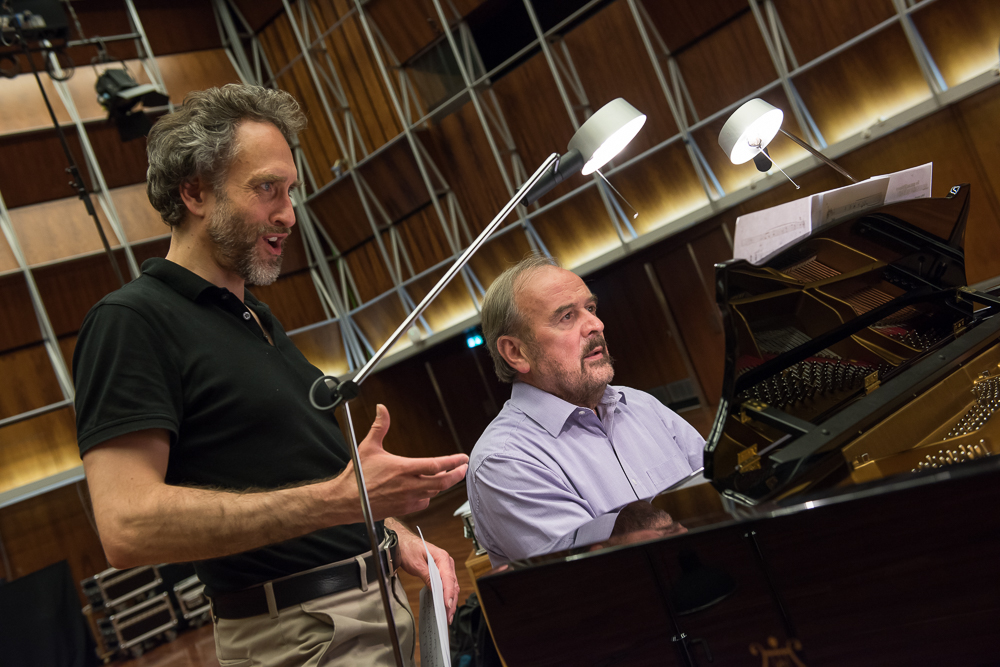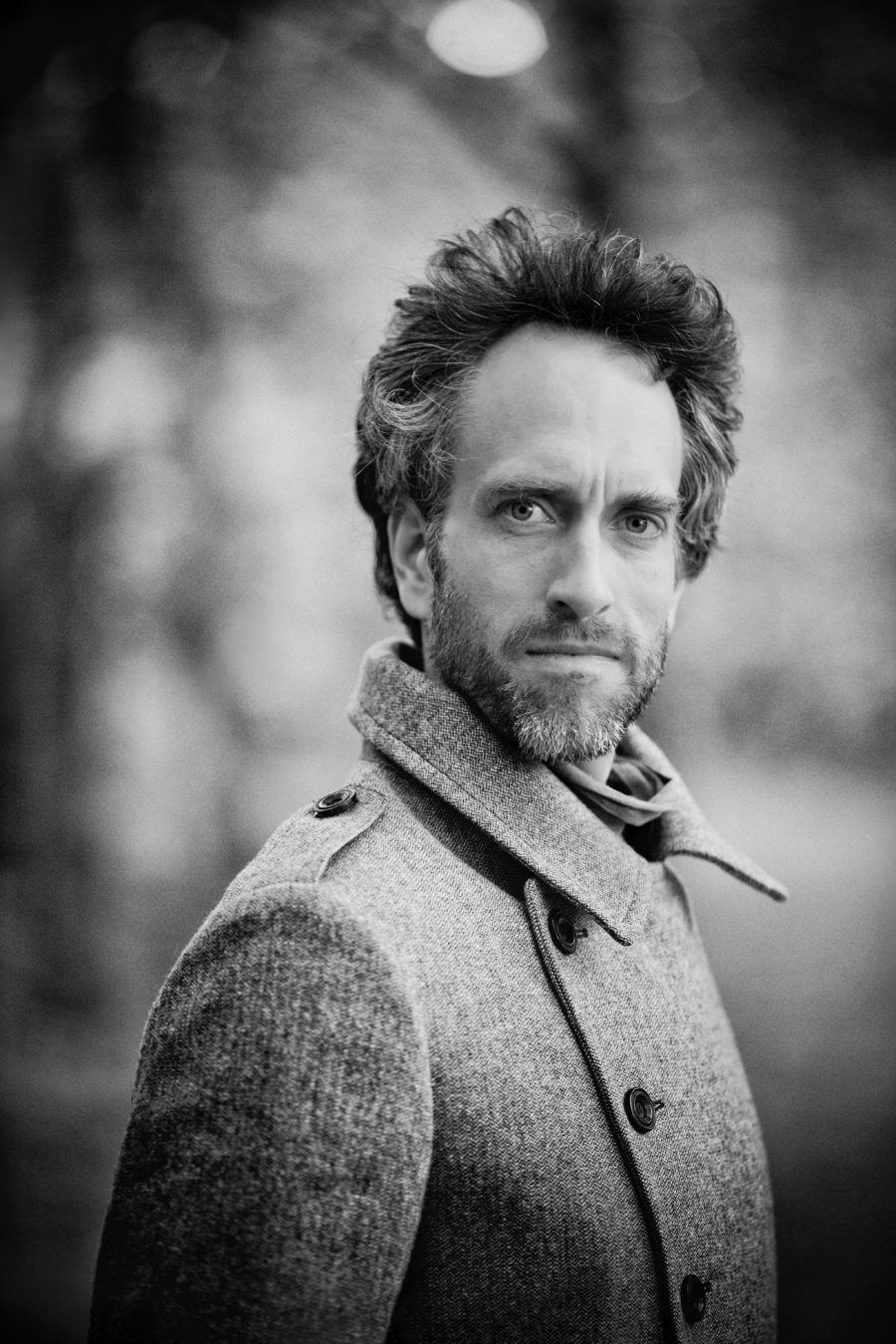Since our last conversation in early 2021, bass baritone Christian Immler has been busy. As was the case with many artists, the bass baritone’s schedule changed dramatically as a result of pandemic-related lockdowns; his approach to music, as you’ll read in our recent conversation below, didn’t change but intensified and expanded, particularly within the realms of score study, synergy with colleagues, and active public engagement.
In December 2022 Immler performed with the Czech Philharmonic and conductor Semyon Bychkov in the lauded world premiere of Prager Symphony, Lyric Fragments after Franz Kafka (Symphony No. 4) by contemporary German composer Detlev Glanert. Based directly on the work of Franz Kafka (including his letters, short stories, novels, and fragments from his notebooks) the work is an immense, daring exploration of the lyric symphonic form, with scoring for orchestra and two voices (bass baritone and mezzo), spread over twelve sections. As the composer told Bachtrack just prior to the premiere, the work is “a psychological landscape, where two people tell us something about ourselves: a story of life from the very beginning to the end, plus all human circumstances you can imagine: being witty, the pain of violence, happiness, and so on.” Prager Symphony will be presented again later this year, with Bychkov and Immler – in June, with the Concertgebouw and Gewandhaus respectively, and the UK premiere happening in November with the BBC Symphony.
Along with learning and performing the Glanert work, the bass baritone also released the album Das heiße Herz (Alpha Classics) with pianist Andreas Frese, featuring the music of Robert Schumann and contemporary German composer Jörg Widmann. Released in mid-2022, the work features songs from Schumann’s 1849 cycle Lieder und Gesänge aus ‘Wilhelm Meister’ (text by Goethe) as well as the composer’s 1850 cycle ‘6 Gedichte von N. Lenau und Requiem’; the world-premiere recording of Widmann’s Heisse Herz (The Burning Heart) comprises the album’s second half, with Immler conveying a stunning (and stunningly controlled) level of musicality, sometimes utilizing sprechstimme to exude the emotional intensity Widmann’s writing necessitates. A review in Opera News early this year (which singled the album out for its monthly Critics Choice designation) noted the degree to which Immler “shows a performance artist’s mastery of the work’s considerable demands, as does the fearless (pianist) Frese, who thunders, tremolos and occasionally slams the keyboard or strums the inside, in addition to playing with great tenderness when called upon.”
Our recent conversation began by my asking Immler about his fascinating exploration of the little-known music of Wilhelm Grosz (1984-1939) and Robert Gund (also spelled Gound; 1865-1927) which use texts by a range of celebrated European writers, including Eduard Mörike (1804-1875), Joseph von Eichendorff (1788-1857), and Clemens Brentano (1778-1842). The album, set for release in early 2025 on Alpha Classics, sees Immler reunite with pianist Helmut Deutsch, with whom he previously collaborated on a gorgeous 2021 album showcasing the largely unknown music of Hans Gál. The thought of Immler and the pianist reuniting for a project featuring music few know well (or are aware of at all) is a needed bit of hope amidst a still-difficult classical environment.
Immler is just embarking on an extensive Northern European tour, performing the work of another composer whose works he knows well; St. Matthew Passion is being presented by famed Bach conductor Masato Suzuki and the Netherlands Bach Society in twelve different locales between March 25th and April 8th. Before the tour began Immler took time to offer thoughts on everything from covid-related cancellations to the earthy writing of both Bach and contemporary composers. Immler is always inspiring to speak with, whether he’s discussing the finer points of scores, sharing the realities of singing works of rarely-heard composers, or how the simple act of breathing informs and influences musicianship; our recent midwinter exchange was, quite simply, a joy.

Christian Immler and Helmut Deutsch. Photo: Marcus Boman
How’s your work with Helmut Deutsch coming along?
It’s great! We both love this repertoire. There are cases where something will seem like a good idea and then you work with someone, in a duo, and it’s one person pulling the other – but not with Helmut, not at all. We both pull in one direction. With this repertoire, it is really a total discovery. I’m not unused to reading through unfamiliar repertoire but this time there is the added thrill of manuscripts – that’s all there is – so we had to transfer them into Sibelius, all these songs composed as lieder. We did a test run for an audience of around ten people, and had to preface it with, “this is most likely the very first performance of this song cycle!”
What has your process been so far?
Helmut has been cursing me – playfully – for introducing him to this repertoire. The Grosz is very difficult to play; there are so many things are happening at the same time in the piano lines, and he says he needs a few more fingers. Nobody realizes how difficult it is, again, because this repertoire is so unknown. We don’t talk very much, a couple of times we verbalize what we want but the rest is push-pull, and listening.
Listening seems vital, whether it’s for a duo project or for larger performances, like Glanert’s Prager Symphony.
A lot of people can listen if they don’t do anything else, but if you have to do your work, playing and singing, and listen at the same time – that’s a special skill set, because you need to do what you do, and intrinsically listen to the other person at the same time. Helmut knows the text, and I know his piano part very well; sometimes I’ll look more down to what he’s doing and not only to my singer’s part. You have to process a lot at the same time. Also, we need to breathe – everybody knows that – but you wouldn’t believe how many conductors ultimately have no idea what that means; Semyon does. He and Helmut both use their breath as a means of expressivity, and it makes all the difference. When they intuitively run out of breath, they renew themselves. So it’s natural, we both do it. If you have well-written repertoire that breath comes very naturally anyway, but if it’s mediocre writing, and the phrases are really long, you think, “okay, I have to take an odd breath here” but it doesn’t usually happen with good composers.
That synergy is interesting given your recent projects use texts by authors who are long dead and/or did not write specifically for singers.
It is known that Kafka, although he did not have an aversion to music, did not want some of his texts set to music..
… and yet!
… yes, Max Brod didn’t quite comply there! He didn’t burn the papers Kafka had written after his death. Glanert and Widmann have both said that at a certain point, they have to let their work go. Both are very experienced, so it means at one point they realize it’s no longer controlled by them, and they accept performers might have a slightly different viewpoint or approach, and I think there is a wisdom in this. They’re both great at letting things go. Glanert was present during rehearsals with the Czech Phil and took notes, and when there were moments of difficulty, instruments groups were too soft or loud or whatever, he, without running to the stage and making a fuss, would take notes, and Semyon would come and they’d communicate about it. The process was super-fluid in terms of it being a true work-in-progress situation. We didn’t have many rehearsals of that, either.
The subsequent performances of it this year may have more rehearsals, then?
I have a huge advantage now because I know the piece, but for orchestras, it’s different. Mind you, those other orchestras – the Amsterdam Concertgebouw, the Leipzig Gewandhaus – are super-orchestras, even with their different approaches. And I have to say also: the Czech Phil is stunning, just… top.
To what extent do you think these songs, and Kafka’s texts, have acquired a new relevance?
It’s funny, that work, as well as the songs I’m doing with Helmut and the theme of my doctoral research, it’s all on work done roughly 100 years ago – yet these poems, at this very moment, in my opinion, have an incredible modernity and relevance. You read some of them, and … well, so I read The Guardian in the mornings, and you see these terrible things about the war in Ukraine, and you see these works, and they resonate as a part of our time, right now.
How does this work and the Widmann speak to that time? And how much do you think listening as a result of that time changed?
Both Widmann and Glanert have a lot of experience in the operatic field and a high level of awareness. They won’t waste opportunities in sound; if they want a big turmoil they know how to create it, and likewise they can create the absence of sound and the power of pauses and stillness. They totally understand – it’s quite unsettling in the Glanert, you think, holy! You could hear a needle drop. It only happens if the ear is preconditioned in the writing, and both of them can do this very well.
For me, and so many who experienced an unprecedented level of isolation and loneliness, and a lack of outside distraction if you will, there was a total feeling of insecurity of what is going to happen. Nobody knew. I find in a lot in these poems, especially in the Kafka texts, there is a sense of basically trying to come out of that situation by saying, “Okay, let’s state we are lonely, and the only way we can kind of overcome this is by stating it first of all and being aware of it, and then sticking together.” This first Kafka text, if you read it, it’s so strong, it states: we are lonely yet we are interconnected by a network of invisible threads, and it’s bad enough if they loosen, but it’s terrible if one of them falls. That, to a certain degree, is what we all experienced in early 2020.
But somehow there is a hope through humanity, and that sounds grand, but these songs don’t leave you feeling dark, they leave you with a sense of… hope is not enough… but that there’s a chance for humanity. And it’s an important balance to what I read in the newspaper.
That seems more rooted in reality.
Yes and I do like that these composers don’t go into the religious sphere or some form of theism, or into any kind of metaphysical sphere at all – everything stays deeply human, earthy and rooted, and thus very approachable. The subtext of them is: you don’t have to be a believer to come out of this darkness.
That’s exactly where they reminded me of Bach, which is perhaps odd…
It’s not odd!
Bach is associated with deep religiosity, but in St. Matthew Passion, for instance, the writing is blood-and-guts human, and it’s the embrace of that messiness which opens the door to the divine. The line between Bach and these modern works is not that long, is it?
It really isn’t It’s funny, I was standing in the Liszt Academy in Budapest recently – which is a total dream building, by the way – I was in a corridor and remembered being there one-and-a-half years ago, being tested with the orchestra, and at 5 in the afternoon the performance was cancelled; the entire bass section had covid. It was like a sudden rain-shower but you don’t know what to do; we are not programmed as artists to know what to do. When I get up on a performance day I am geared to that one thing in the evening when I am meant to deliver. It’s a lot of energy… this very earthy, a very sharply human experience…
How has that time influenced you in terms of singing both contemporary music like Widmann and Baroque?
In terms of the Widmann, it’s the most difficult thing I’ve ever learned, and if you don’t hear that I take it as a compliment. The scoring is very detailed! He is a total musician; he wants to define it as well as possible, but then you have to have it in your system. The actual level of preparation was intense; there is so much information coming your way, you can’t ignore it, and say, “Oh I feel it this way” – that isn’t possible. You have to prepare it to that level of detail and then know it subconsciously. It was an incredible amount of preparation, apart from pitching and rhythm, and the extended vocal techniques; he would write things in the direction like, ‘Dangerously Through Your Teeth’ or ‘Psychedelically Sung’ for certain passages, but it always makes sense. And, this may sound banal, but it could be Widmann or Monteverdi or Bach or Glanert, but look at it and I’ll think, “This is just top-class writing!”
Do you think preparing for something like the Widmann works would have been different in 2019?
I would say no …
So the pandemic didn’t change your approach that much… ?
It changed how people got together, via Zoom or not at all. The loneliness of preparation, overall, was strong for everything. Just after musicians here were allowed to come together again I did the Beethoven/Leonore with René Jacobs, it was just a piano rehearsal with the cast, and everybody started crying. It was such a release of… like, you can practice and vocalize, but it’s a profession which has to be done in community, and with a third ingredient in this: the public. The feeling of being together was unbelievable. For this experience we were grateful to have that return, to know we weren’t alone.
So yes, I stayed faithful to preparing well and being detailed, but, like the first time I sang the St. Matthew Passion, you come out of the pandemic experience a different person, obviously. It changes your whole perception of music and life. You can prepare the piece but the effect it leaves when you present it live… you cannot prepare for that.


